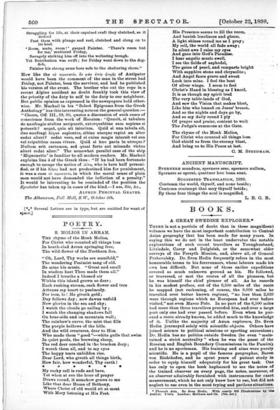o_ of thoorirdo, ;iv yip iirp Ikon of Antipater would
have been the comment of the man in the street had Friday, not Painter, been the survivor, and had he published his version of the event. The brother who cut the rope in a recent Alpine accident no doubt frankly took this view of the priority of the duty to self to the duty to our neighbour. But public opinion as expressed in the newspapers held other- wise. Mr. Mackail in his "Select Epigrams from the Greek Anthology" has this interesting note on the general question :— " Cicero, Off. Ill., 89, 90, quotes a discussion of such cases of conscience from the work of Hecaton: Qumrit, si tabulam de naufragio atultus arripuerit, extorquebitne earn sapiens si potuerit? negat, quia sit iniurium. Quid si una tabula sit, duo naufragi hique sapientes, sibine uterque rapiat an alter cedat alteri? cedat vero, sed ei cains magis intersit vel sua vel reipublicm cause vivere. Quid si hue paria in utroque ? Nullum erit certamen, sed quasi forte ant micando victus alteri cedat alter." The somewhat parallel case of the ship 'Mignonette' is familiar to all modern readers. Mr. Mackail explains line 4 of the Greek thus : "If he bad been fortunate enough to escape the notice of Atza, who is here half personi- fied, or if his KipE; had not predestined him for punishment, it was a case ot) 1,E1.6f.L017, in which the moral sense of plain men would not have demanded the infliction of a penalty." It would be interesting to be reminded of the position the Spectator has taken up in cases of the kind.—I am, Sir,
ALFRED PERCEVAL GRAVES.
The Atheneum, Pall Mall, S. TV., October 5th.
[*,,* Several Letters are in type, but are omitted for want of space.]
POETRY.
S. MOLIOS IN ARRAN. THE rhyme of the Monk Molios, For Christ who counted all things loss In heath-clad Arran springing free, The wild-flower of the Northern Sea.
"Oh, Lord, Thy works are manifold," The wondering Psalmist sang of old.










































 Previous page
Previous page